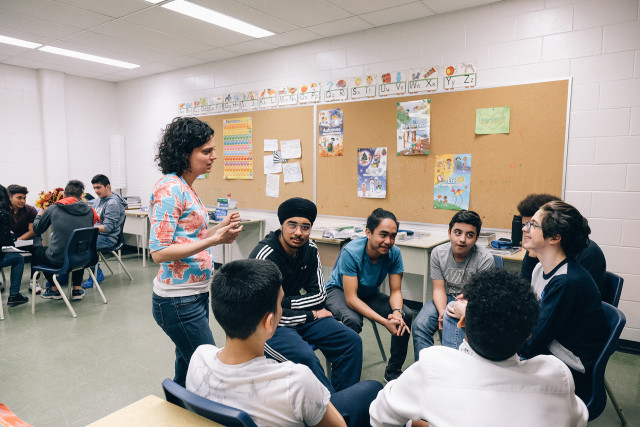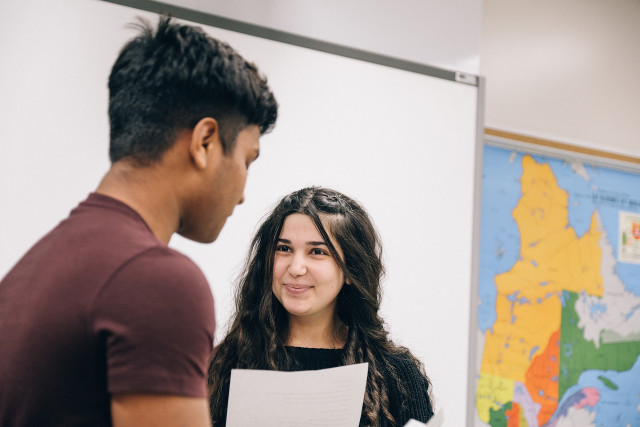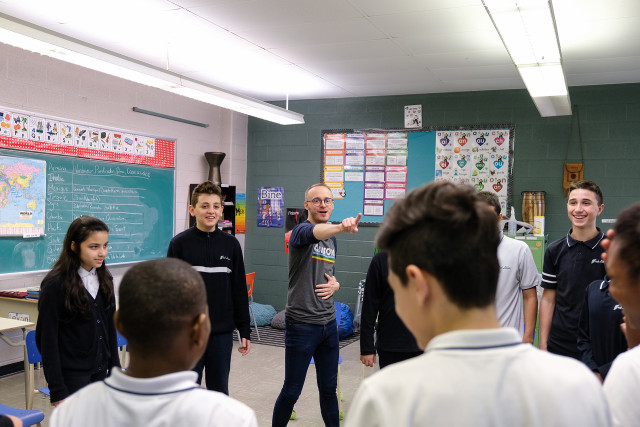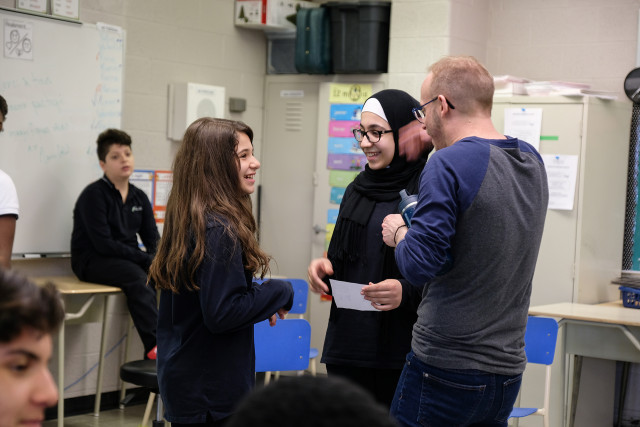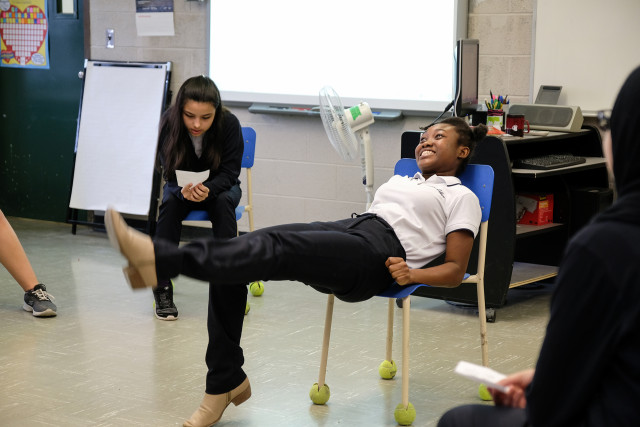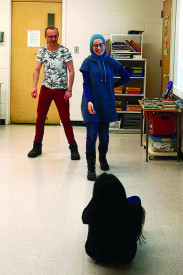How theatre can forge ties between cultures
Frédérick Moreau shows how culture can be a powerful way to create bonds, using the example of his artistic expression workshops for young newcomers. These workshops serve as an academic springboard for these students, while helping them find reference points in their new society.
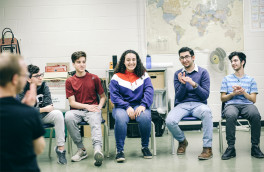
Students interact with Frédérick Moreau (left) during a workshop organized by Rencontre Théâtre Ados. Photo by Bastien Carrière.
“As artists, how can we make ourselves useful in direct relation to people’s day-to-day lives?” As a stage director, I constantly ask myself this question. For three years now, I have found part of the answer, as a cultural mediator in reception classes with teenage newcomers to Quebec who must learn a new language and live in an entirely new culture. I want to encourage these students to open themselves up to others. I want them to see that culture is a gateway to empathy, to the possibility of living in a world with multiple viewpoints.
Young people, regardless of their culture, are sometimes presented with a stereotypical view of the world. Through art, they discover that, even though each person has a unique path, everyone in their group has the same objective: to express themselves, to understand and to be able to attend regular classes. If their achievement of this goal can be made even a bit easier, then my work is done. And culture directly contributes to this educational success. I watch them evolve from the beginning of the year, when they rely more on gestures than on words, to the end, when they can create and present a story of their own, using the vocabulary they have learned and looking up words in the multilingual dictionary, as if constantly moving from one culture to another.
The reception class program was implemented by Rencontre Théâtre Ados, an organization celebrating its 24th anniversary. It places teenagers at the heart of artistic discovery, particularly during its annual theatrical creation festival. The demand for these workshops initially came from a teacher who wanted to work on spontaneous communication with her students. Very quickly, the number of workshops grew from 15 the first year to 195 the second year, and last year to as many as 400.
The main goal of the project, overseen by cultural mediation artists, is to help adolescents, in a playful and non-academic way, to develop bonds and appropriate elements of their new culture through experiential learning. While fostering closer links between different cultures, the workshops also introduce them to theatrical improvisation. Through this, they improve their ability to respond to speech and express themselves more spontaneously, while also encountering new cultural elements from Quebec. Access to these forms of art (and to culture in general) is not easy to provide in Laval, because the city’s area is vast and does not contain many performance venues. The idea is to reach out to young people in their classrooms, in the hopes of igniting the spark of creativity, creating an interest in their new culture and helping them understand that culture is accessible and ubiquitous.
Culture becomes essential to creating connections, references and running gags, all of which will help these youths develop closer relationships with the people around them.
The workshops are guided by the principle that teenagers, regardless of their culture, are in the process of forging their identities. The reception classes place them in a new social and academic context; at times, they do not possess the language and cultural tools they need to express themselves adequately. The themes of the workshops reflect the students’ personal interests, from video games to shopping and music. Artistic activities arise from the chosen theme, and include improvisations and various theatre games. The workshops are intended as a playground for the newcomer to explore culture and language. For instance, they can draw inspiration from song lyrics to imagine and create dialogues, or use their persuasive talents to sell invented objects to a group. The focus is on the process, not the result. This positive experience of culture and language can ultimately change the participants’ relationship with their new culture and help them develop a sense of attachment to it. In forging their identity, the students can choose the elements of the workshops that resonated with them, and maybe even share them with their parents or friends. As a result, culture becomes essential to creating connections, references and running gags, all of which will help these youths build relationships with the people around them.
- Let’s unbias Canadian newsrooms and get refugee journalists working again
- Cultivating love of home through public radio
- Do commercial radio stations owe Canadians diversity?
This program can be given in any other cultural or linguistic environment. After all, it is an approach that focuses on creating a dialogue between the original cultural background of a young newcomer and the culture of his/her new country. The initiative aims to use theatre and cultural mediation as a springboard for students’ academic and social success, and enhance their education. Working in conjunction with their teachers, we try to get to know the students better and ignite a spark of creative passion and curiosity. Through these workshops, I was able to see the students portray superheroes, their grandparents or the characters in Romeo and Juliet. Basically, I saw them escape their daily lives, which are often hard, given what they have been through. The workshops also give the students an opportunity to gradually explore various creative tools and become aware of many points of view. The ultimate goal is for culture to give birth to a microcosm that is a reflection of real life. Therefore, the heterogeneity of the classroom becomes a strength, not a weakness.
Cultural activities provide young newcomers with points of reference they can use to better understand their new culture.
Being engaged in this creative process, either as a professional artist, as a teacher or as a student, is a way to fight stereotypes while enriching one’s life. It is a way to learn about the students’ different cultures and to teach them about our own. Thus, I have observed that culture, through the medium of theatre, is a way to create connections. First of all, it creates connections between classmates who do not speak the same language. The language of the new country becomes something they have in common, a binding force that allows them to find common references, while helping them understand the reality of others. Each word that is learned and understood in the common language represents a small victory over incomprehension. As a result, bonds between cultures are created: the students enjoy using new expressions and even share how things were in their country of origin. It’s an opportunity to verbalize the changes and challenges arising from their move. In the workshops, the students often show a different side of themselves, and teachers can see them in a different light. Lastly, these workshops offer access to what sometimes isn’t taught directly at school: the use of a language that’s more spoken than written, that’s closer to what they hear on a daily basis and in the media. For students trying to learn a new language, the variations between written and spoken discourse mean they almost have to learn two languages at once. Québécois French contains many examples of this (for instance, the written “elle a” seems to have nothing to do with its more colloquial spoken form, “a'la”). These activities provide the teenagers with points of reference they can use to understand their new culture.

Still from a video showing students at Laval's Ecole Saint-Maxime participating in a French-language workshop put together by Rencontre Théâtre Ados.
When I see youngsters laughing before a performance given by their peers, integrating aspects of their life and culture into an improvisation or reusing expressions, actions and games learned during the workshops, the usefulness of theatre becomes obvious. Indeed, theatre opens a window of understanding between teenagers and adults, and fosters empathy. I sincerely hope this experience will help the students be even more curious in the future. Over time, they will surely also become torchbearers of culture and encourage others to take an interest in it, in the most diverse way possible.

